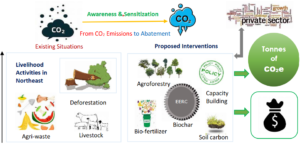About the Project
Northeast Nigeria (NEN) is characterized by harsh weather conditions, with the majority of the population being smallholder farmers, pastoralists, fishermen/women, and forest-dependent households who derive their livelihoods from natural resources and thus, are most vulnerable to climate shocks and natural hazards and consequently loss of investments leading to low productivity and income. EERC is partnering with Mercy Corp to Build Resilience to Climate Change and Carbon Market Opportunities in Smallholder Farming Systems in Northeast Nigeria under the “Feed the Future Rural Resilience Activity (RRA), a 5-year (2019 – 2024) project funded by the United States Agency for International Development (USAID).
EERC aims at building resilience to climate change by promoting climate change mitigation and adaptation practices that have the potential to not only increase productivity and conserve the environment but also increase productivity as well as create opportunities for carbon credits among the beneficiaries. The project has three main objectives and these include:
- Enhance the capacity of the state government to establish a suitable platform for carbon market mechanisms as well as ensure mitigating the impact of climate change across the state.
- Promote Agro-forestry among 3000 farmers to create multiple benefits such as improved food security, livelihoods, ecosystem functions, regeneration of degraded farmland, and lasting income generation from carbon markets.
- Promote the effective utilization of agro-waste and carbon farming practices among 7000 farmers to reduce the incidence of soil erosion, improve the productivity and income of smallholder farmers as well as enhance the sustainable utilization of resources, thereby reducing the impact of climate change.
The project will adopt a market-led approach to improve livelihood, build the resilience of farm households to climate change, and increase income through participation in agroforestry and carbon farming opportunities thereby reducing the incidence of soil erosion, improving the productivity and income of smallholder farmers as well as enhance the sustainable utilization of resources, thereby reducing the impact of climate change in Adamawa and Gombe State.
The Project Concept




